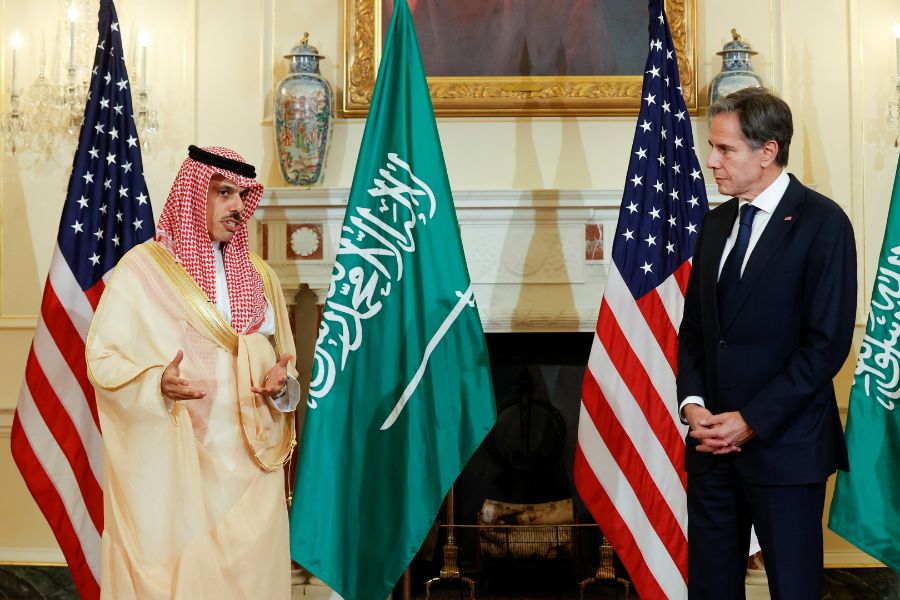
-
Published: 03 June 2023

After Sullivan .. Blinken is in Riyadh to heal the rift in its relations with Saudi Arabia
With two visits by high-level officials in less than a month, the United States hopes to restore stability to its relations with Saudi Arabia after a few years of disagreements and mistrust.
Edited by| Christian Megan
Middle East section - CJ journalist
Washington - June,3,2023
After the visit of White House national security adviser Jake Sullivan to Saudi Arabia on the seventh of May last, the US State Department said that Secretary of State Anthony Blinken will travel to the kingdom next week, in the second visit by a senior official in about a month.
Despite expectations of no breakthrough, analysts said Blinken aims the trip to regain some influence with Riyadh on oil prices, counter Chinese and Russian influence and boost hopes for eventual Saudi-Israeli normalization.
The State Department said in a brief statement that the visit will run from Tuesday to Thursday and will discuss economic and security cooperation, as well as a meeting of the US-Gulf Cooperation Council and a conference to confront Islamic State militants.
Blinken will tackle relations that have been badly damaged by disagreements over Iran and the murder of journalist Jamal Khashoggi in 2018 and weakened as the oil-for-Security formula that has maintained the alliance between the two countries for decades fades.
President Joe Biden's start with Riyadh was tense after he said in 2019 that he would make it a “pariah”, and shortly after taking office in 2021, he allowed the disclosure of a US intelligence assessment that indicated that Saudi Crown Prince Mohammed bin Salman agreed to arrest or kill Khashoggi. Saudi Arabia has denied the Crown Prince's involvement.
Although Biden visited Saudi Arabia in July 2022 with the aim of improving relations, Riyadh angered Washington only three months later when the OPEC+ alliance, which includes Russia, reduced oil production before the US midterm elections, one of the issues of which was fuel prices.
Saudi leaders have expressed dissatisfaction with the US negotiations on the 2015 Iran nuclear deal, which the Gulf states believe has left them vulnerable to the possibility of Tehran eventually acquiring nuclear weapons. Iran denies such an ambition.
Although former US President Donald Trump abandoned the agreement in 2018, Riyadh expressed anger over the lack of response to Iran after a drone and missile attack targeting oil facilities in Saudi Arabia's Abqaiq and Khurais in 2019.
Washington and Riyadh blamed the attacks on Tehran, which denied involvement.
“They (the Saudis) wanted to see the rubble in Tehran after the Abqaiq (attacks),” said David de roche of the US National Defense University, adding that Riyadh expected Trump to respond by ordering air strikes. Saudi authorities did not respond to a request for comment.
First, the long-standing pillar of U.S.-Saudi relations-the U.S. providing security in exchange for a steady supply of Saudi oil-is crumbling.
The United States is the largest oil producer in the world now and is no longer dependent on Saudi crude as it was in the Seventies.
Chas Freeman, a former U.S. ambassador to Saudi Arabia, said: “the two sides of the equation-preferential access to Saudi Energy and U.S. defense of Saudi Arabia against external challenges-seem to have faded.
Secondly, the rise of China, which is now the largest buyer of Saudi oil and the largest supplier to Saudi Arabia, as well as the so-called American “focus” on Asia, has led Riyadh to hedge its geopolitical bets.
Professor Gregory Goss of Texas A & M University said, “in the Cold War, the United States could largely rely on the Saudis to support its grand strategic initiatives. With the end of the Cold War, the Saudis no longer have many options,”he said.
“Now they have options... the American unipolar period is basically over and the Saudis understand that and are looking for other options,”he added.
In a sign of shifting allegiances, Saudi Arabia and Iran said in March they planned to resume diplomatic relations after secret talks in Beijing.
Daniel bynim, US Assistant Deputy Secretary of state, told reporters that one of the goals of Blinken's trip was to emphasize that “the United States is a strong player who will remain present in the region... and that we will not leave a vacuum to be filled by other competitors”.
Whatever the tensions, there is unlikely to be a real break in relations because Riyadh needs the US military to ensure the flow of oil from the Gulf, a role that neither China, nor Russia, which has expanded its influence in the region, is willing to undertake. Washington also wants to cushion Riyadh from global oil prices.
But there is one goal that the United States is unlikely to achieve any time soon: to convince Riyadh to follow in the footsteps of Arab countries, including the UAE and Bahrain, normalized relations with Israel under the so-called Ibrahim accords in 2020.
Barbara Lev, the top US diplomat in the Middle East, called reports in the Israeli press about this possibility “excessive exaggerations”.
She said that the Saudi crown prince has other priorities, especially those related to the Vision 2030 plan to modernize the kingdom's economy and reduce its dependence on oil, and said that smaller steps such as sports events could improve relations with Israel.
A Gulf official, who asked not to be named, said this would be difficult. He predicted that there will probably be no normalization in the life of Saudi King Salman bin Abdulaziz and in the presence of right-wing Israeli Prime Minister Benjamin Netanyahu in power.
{source}<script async src="https://pagead2.googlesyndication.com/pagead/js/adsbygoogle.js?client=ca-pub-4474625449481215"
crossorigin="anonymous"></script>
<!-- moss test ad -->
<ins class="adsbygoogle"
style="display:block"
data-ad-client="ca-pub-4474625449481215"
data-ad-slot="6499882985"
data-ad-format="auto"
data-full-width-responsive="true"></ins>
<script>
(adsbygoogle = window.adsbygoogle || []).push({});
</script>{/source}
